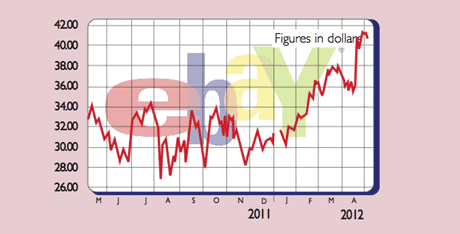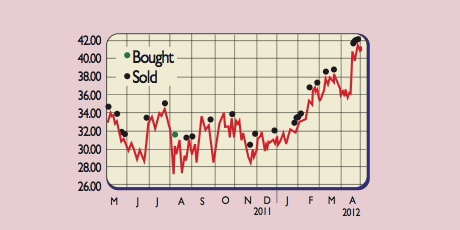Shares in focus: Make a bid for eBay
Can internet auction site eBay and its online payment system PayPal continue to deliver? Phil Oakley investigates.
Get the latest financial news, insights and expert analysis from our award-winning MoneyWeek team, to help you understand what really matters when it comes to your finances.
You are now subscribed
Your newsletter sign-up was successful
Want to add more newsletters?

Twice daily
MoneyWeek
Get the latest financial news, insights and expert analysis from our award-winning MoneyWeek team, to help you understand what really matters when it comes to your finances.

Four times a week
Look After My Bills
Sign up to our free money-saving newsletter, filled with the latest news and expert advice to help you find the best tips and deals for managing your bills. Start saving today!
EBay'sonline auction site and PayPal system will continue to deliver, says Phil Oakley.
The business
Best known as an auction website, eBay in fact has two main businesses. The company is the world's largest online marketplace, with over 102 million active users. It allows customers to buy and sell goods using auctions or fixed selling prices. The eBay website is also a major shop front for many businesses.
Meanwhile, PayPal, which eBay owns, is a secure, online payment system with 109 million accounts. It allows users to both make and to take payments over the internet and by mobile phone without their card details being shared. The group had total sales of $11.6bn in 2011.
MoneyWeek
Subscribe to MoneyWeek today and get your first six magazine issues absolutely FREE

Sign up to Money Morning
Don't miss the latest investment and personal finances news, market analysis, plus money-saving tips with our free twice-daily newsletter
Don't miss the latest investment and personal finances news, market analysis, plus money-saving tips with our free twice-daily newsletter
The history
French-born American entrepreneur Pierre Omidyar created an online auction site called AuctionWeb in 1995. The first item sold was his broken laser pointer, which fetched $14.83. By 1997, the company's name had been changed to eBay and it had sold more than a million items. In 1998, the company floated on the stock exchange and saw its shares soar in value during the internet boom.
In the same year, Meg Whitman joined the company as chief executive and presided over a period of rapid growth. Under her leadership eBay branched out into other internet businesses. In 2002, it bought PayPal in order to increase the level of confidence eBay users felt about paying for goods bought on the site. In 2005, it bought online communication business Skype. However, eBay never really got the best out of Skype and sold the business in 2009.
By the mid-2000s, eBay's online auction business was showing signs of tiredness. Customers complained about the user experience, while the company also faced increasing competition from the likes of Amazon.com. The recession also took its toll on consumer spending and eBay suffered a period of falling profitability. However, under current chief executive John Donahoe, who took over in 2008, the auction business has been turned around, while PayPal has continued to grow rapidly.
The chief executive
Donahoe joined eBay in 2005 as head of its e-commerce business. Prior to this, he worked for venture capital firm Bain & Co (also a former employer of US presidential candidate, Mitt Romney). As a leader, Donahoe places a lot of emphasis on talking and listening to customers and employees and using their opinions to improve the business. A big fan of gadgets, his latest plan is to make PayPal a leader in mobile-phone payments. He was paid $16.5m in 2011.
Should you buy the shares?
The company looks to be in rude health. The problems of a few years ago have been sorted out and its strategy is now paying off. The decision to focus on larger, professional retailers selling goods at a fixed price has worked. It is delivering good sales growth and improving the quality and sustainability of profits.
But the real reason to buy eBay shares is PayPal. The growth of PayPal looks set to continue as ever-increasing numbers of businesses adopt it. PayPal is also expanding into mobile-phone payments, which gives it another source of growth. At the moment there does not seem to be a competitor capable of challenging its dominance.
Add in the fact that PayPal is a very profitable business and what you have is an extremely valuable asset that we believe is not yet sufficiently reflected in eBay's share price. Given the rapid growth of PayPal, it will probably be eBay's biggest source of revenue within a few years, which could lead the stockmarket to consider eBay in a more favourable light.
On the downside, shares in the company are not cheap, and like many technology companies, it is yet to pay a dividend. However, eBay looks as though it can keep delivering high rates of profit growth for its shareholders. On top of this, it also generates cash and has a squeaky-clean balance sheet with no debt. This makes the shares a buy for the long term.
The numbers

Stockmarket code: EBAY
Share price: $40.38
Market cap: $52.1bn
Net assets (Mar 2012): $18.7bn
Net cash (Mar 2012): $3.7bn
P/e (current year estimate): 21.3 times
Yield (prospective) N/a
What the analysts say
Buy: 23
Hold: 11
Sell: 0
Average price target: $43.45
Directors' shareholdings

P Omidyar: 131,488,408
R Swan: 388,807
J Donahoe: 426,780
Get the latest financial news, insights and expert analysis from our award-winning MoneyWeek team, to help you understand what really matters when it comes to your finances.
Phil spent 13 years as an investment analyst for both stockbroking and fund management companies.
-
 How a ‘great view’ from your home can boost its value by 35%
How a ‘great view’ from your home can boost its value by 35%A house that comes with a picturesque backdrop could add tens of thousands of pounds to its asking price – but how does each region compare?
-
 What is a care fees annuity and how much does it cost?
What is a care fees annuity and how much does it cost?How we will be cared for in our later years – and how much we are willing to pay for it – are conversations best had as early as possible. One option to cover the cost is a care fees annuity. We look at the pros and cons.